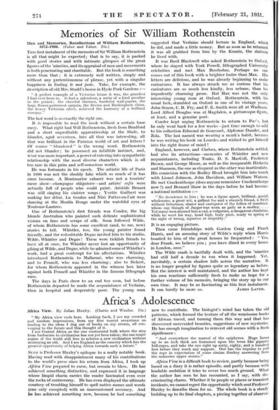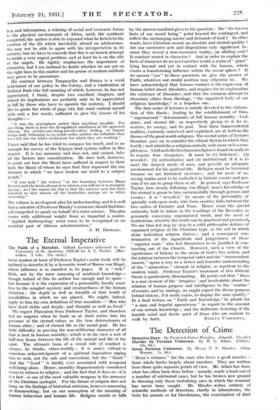Africa's A dolescence
Africa View. By Julian Huxley. (Chatto and Windus. 15s.) " My Africa view ends here. Looking back, I see my crowded and random impressions, from my first tourist sensations on landing to the ideas I dug out of books on my return, all con- verging to the future and this thought of it.
I see Central Africa as the one continental bulk where the step from barbarism to civilization has not yet been taken; the one major region of the world still free to achieve a new civilization without destroying an old. And I see England as the country which has the greatest opportunity of helping Africa towards such a future."
Sven is Professor Huxley's epilogue to a really notable book. Having read with disappointment many of his contributions to the world's press since his return from Africa, I took up Africa View prepared to curse, but remain to bless.. He has achieved something distinctive, and expressed it in language whose limpid charm carries the reader fascinated even over the rocks of controversy. He has even displayed the ultimate courtesy of troubling himself to spell native names and words (one only excepted) with an unaccustomed accuracy. And he has achieved something new, because he had something new to contribute. The biologist's mind has taken the old
patterns, which formed the texture of all the wearisome books of African travel, and turning them this way and that has
discovered unrevealed beauties, suggestions of new mysteries. He has enough imagination to reinvest old scenes with a fresh
significance :
" And everywhere the marvel of the epiphytes. Huge lianas up to an inch thick are festooned upon the trees like gigantic bell-ropes, and take the eye right up sixty, eighty, and a hundred feet before they reach any support. One has the impulse to pull the rope in expectation of some simian flunkey answering from the unknown upper stories."
Africa View is a difficult book to review, partly because being based on a diary it is rather episodic, and partly because with laudable ambition it tries to cover too much ground. What the author has _seen he has recounted, as I say, with dis- criminating charm. Whether it be people or places or transient incidents, we cannot regret the opportunity which sent Professor Huxley to describe them for us. The whole book is a steady building up to its final chapters, a piecing together of observa-
tion and information, a relating of social and economic forces to the physical environment of Africa, until, the synthesis completed, the author is able to expound what he feels to be the solution of the ills which inevitably attend on adolescence. We may not be able to agree with his interpretation in its entirety, but we have to concede that this is an honest attempt
to tackle a very urgent problem, and at least he is on the side of the angels. He rightly emphasizes the importance of
education, but I am inclined to doubt whether we are yet on the right lines in this matter and his praise of modern methods may prove to be premature.
His contrast between Tanganyika and Kenya _ is a vivid
indictment of our policy in the Colony, and a vindication of Indirect Rule (the full meaning of which, however, he has not appreciated, I think, despite two excellent chapters, and indeed its implications are probably only to be appreciated in full by .those who have to operate the system). I should like to quote the whole of page. 144, but must content myself with only a few words, sufficient to give the tenour of his thoughts " It was the atmosphere rather than anything tangible. For one thing, there is hero the ill-regulated untidiness of the uprooted African, the neither-one-thing-nor-the-other feeling, of human beings truly belonging to no stable order, neither the tribalism they have left nor the white civilization for which they are working."
I have said that he has tried to compass too much, and as an example his survey of the Kikuyu land system suffers in this respect. It is too summary and does not, and cannot, take all the factors into consideration. He does well, however, to point out how the Masai have suffered in respect to their land, the Masai of whom he says that they represent the one instance in which " we have broken our word to a subject people."
" If you look " (he writes) " at the boundary between Masai Reserve and the lands alienated to whites, you will see it is strangely zig-zag ; and the reason for this is that the natives' area has been indented so that almost all the borderline springs are in white ownership."
The volume is an eloquent plea for understanding, and it is well that a scientist of Professor Huxley's eminence should find him- self compelled to speak on behalf of a sister science. The plea comes with additional weight from so impartial a source.
" Applied Anthropology must come to be recognized as an essential part of African administration."
J. H. DRIBERG.












































 Previous page
Previous page